October Visual Primary Sources for the History Classroom
Activities for the History Classroom
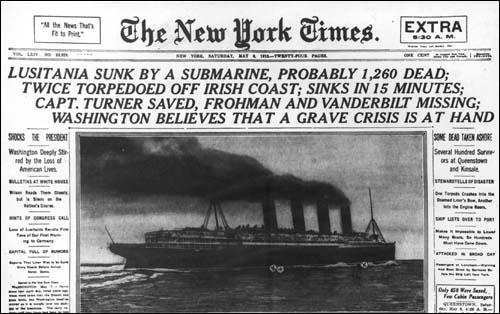
29th October, 2021: The Manchester Guardian (10th May, 1915)
The death roll in the Lusitania disaster is still not certainly known. About 750 persons were rescued, but of these some 50 have died since they were landed. Over 2,150 men, women and children were on the liner when she left New York, and since the living do not number more than 710, the dead cannot be fewer than 1,450.
What the American people think of the crime is plain. Their newspapers are violent in denunciation; the public, except for the German-Americans, who have celebrated the event as a great and typical victory for their native country, are enraged. How President Wilson regards the affair no one knows. A semi-official statement issued from the White House says he knows the nation expects him to act with deliberation as well as firmness.
It should be remembered that the United States have many and peculiar difficulties of their own, and that Dr. Wilson personally will go to almost any length before he consents to a breach with Germany. His fixed aim is to preserve the world's respect by abstaining from any course of action likely to awaken the hostility of either side in the war, and so to keep the United States free to undertake the part of peacemaker.
Throughout the world the news has been heard with horror. In Norway, Sweden, Holland, Spain and Italy, as well as in the territories of the Allied Powers, the newspapers express an unhesitating condemnation. Even journals who regard Germany as a friend have no excuse to offer. In several quarters the British Navy is sharply criticised. Why, it is asked, were not the submarines known to be off the Irish coast hunted down? Why was the liner not escorted into safety? These questions, which are to be found here and there in the neutral press, have been put also by many among the survivors. Possibly an official answer will be made in due course.
In Germany and Austria the people are undisguisedly delighted. They see in the sinking of the liner a fulfilment of all their boasts about the submarine blockade, which has hitherto signally failed to win any military or naval advantage. The newspapers seek to find an excuse in the Lusitania's armament. Their charge is false. Both the Admiralty and the Cunard company declare positively that the ship carried no guns. She had never done so, and the Government, although they had the right to employ her, had never called for her services. She was a genuine non-combatant merchant vessel.
Survivors tell the most terrible stories of their adventures. Some say the crew behaved bravely, others make no mention of such a thing, but all agree that few of the lifeboats were launched, that the ship went down quickly, and that hundreds were sucked under with her. Several survivors were drawn by the rush of water into the funnels, to be thrown to the surface a few moments later. Two torpedoes struck the liner, and she sank with half an hour of the first blow. Because of an injury to the engines it was not possible to stop the propellers at once, and the ship did not lose way until ten minutes had passed. During those precious ten minutes no boats could be launched from the moving vessel.
Question: The governments of Britain and the United States used the sinking of the Lusitania to produce anti-German propaganda. This often took the form of posters. Use the report from the Manchester Guardian to describe what you would put on your poster.
For other questions on this subject see: Sinking of the Lusitania (Answer Commentary)
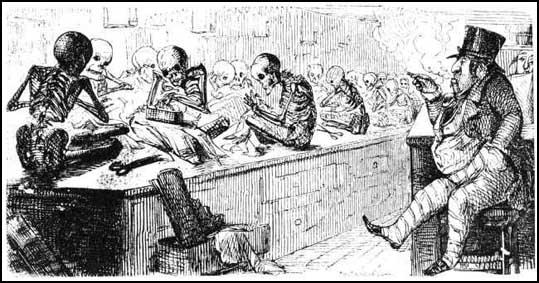
28th October, 2021: William Cooke Taylor, A Tour in the Manufacturing Districts of Lancashire (1842)
I met a man on the road for Colne... He had been a weaver and in prosperous times had earned from thirty to forty shillings per week... work began to grow slack... he began to sell his furniture... For the last seven weeks he has been without work of any kind... When I offered him a shilling, he refused until I had given him my name and address, that he might repay it.
Question: What does the source above tell you about the attitude of this weaver.
For other questions on this subject see: The Plight of the Handloom Weavers (Answer Commentary)
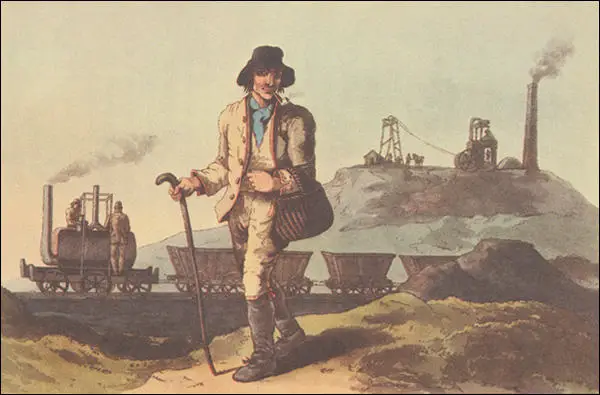
27th October, 2021: In 1841, Charles Young took a young friend, William Hinton, to see his first railway locomotive. When the locomotive went past, Hinton fainted.
When he recovered his feet... amazement was stamped upon his face. It must have been five minutes before he could speak... Well, sir, that was a sight to have seen; but one I never care to see again! How much longer shall knowledge be allowed to go on increasing.
Question: What does William Hinton mean by the comment: "How much longer shall knowledge be allowed to go on increasing."
For other questions on this subject see: Early Development of the Railways (Answer Commentary)

26th October, 2021: Catherine Howard, confession (7th November, 1541)
My sorrow I can by no writing express, nevertheless I trust your most benign nature will have some respect unto my youth, my ignorance, my frailness, my humble confession of my faults and plain declaration of the same, referring me wholly unto your Grace's pity and mercy. First at the flattering and fair persuasions of Manox, being but a young girl I suffered him at sundry times to handle and touch the secret parts of my body, which neither became me with honesty to permit, nor him to require.
Also Francis Dereham by many persuasions procured me to to his vicious purpose, and obtained first to lie upon my bed with his doublet and hose, and after within the bed, and finally he lay with me naked, and used me in such sort as a man doth his wife, many and sundry times, and our company ended almost a year before the King's Majesty was married to my Lady Anne of Cleves, and continued not past one quarter of a year, or a little above... The subtle persuasions of young men and the ignorance and frailness of young women.
I was so desirous to be taken unto your Grace's favour, and so blinded with the desire of worldly glory, that I could not, nor had grace, to consider how great a fault it was to conceal my former faults from your Majesty, considering that I intended ever during my life to be faithful and true unto your Majesty after; nevertheless, the sorrow of mine offences was ever before mine eyes, considering the infinite goodness of your Majesty towards me from time to time ever increasing and not diminishing: Now I refer the judgement of all my offences with my life and death wholly unto your most benign and merciful Grace to be considered by no justice of your Majesty's laws but only by your infinite goodness, pity, compassion and mercy, without the which I acknowledge myself worthy of extreme punishment.
Question: Does Catherine Howard's confession prove she was guilty of committing adultery?
For other questions on this subject see: Was Queen Catherine Howard guilty of treason? (Answer Commentary)
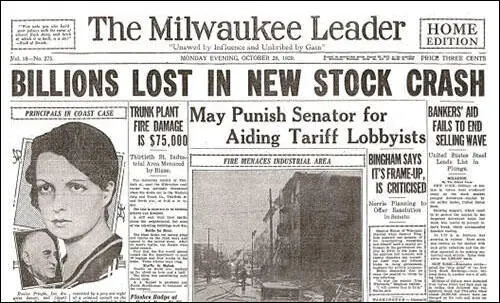
25th October, 2021: John J. Raskob, Everybody Ought to be Rich, Ladies Home Journal (August, 1929)
The common stocks of their country have in the past ten years increased enormously in value because the business of the country has increased. Ten dollars invested ten years ago in the common stock of General Motors would now be worth more than a million and a half dollars. And General Motors is only one of may first-class industrial corporations.
If a man saves $15 a week, and invests in good common stocks, and allows the dividends and rights to accumulate, at the end of twenty years he will have at least $80,000 and an income from investments of around $400 a month. He will be rich. And because income can do that, I am firm in my belief that anyone not only can be rich, but ought to be rich.
Question: Explain the flaws in John J. Raskob argument.
For other questions on this subject see:The Wall Street Crash (Answer Commentary)
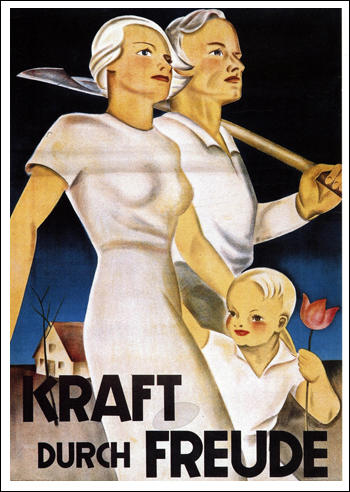
22nd October, 2021: Hermann Schmidt, a senior figure in the Labour Front, was interviewed in 1938 about life in the Nazi Party.
I hate the treatment of the Jews. I think it is a bad side of the movement and I will have nothing to do with it. I did not join the party to do that sort of thing. I joined the party because I thought and still think that Hitler did the greatest Christian work for twenty-five years. I saw seven million men rotting in the streets - often I was there too, and no one, not even the Churches, seemed to care that it was a wicked thing that children of God should be thus left to rot. .. Then Hitler came and he took all those men off the streets and gave them health and security and work at least for the time being. Wasn't that a Christian act? So it was because I am a Catholic that I said, "I will join the party and I will do all I can to help a movement which refuses to let the young manhood of this nation be wasted."
Question: Why did Hermann Schmidt think Adolf Hitler was a great Christian but still dislike his Anti-Semitism?
For other questions on this subject see: Trade Unions in Nazi Germany (Answer Commentary)
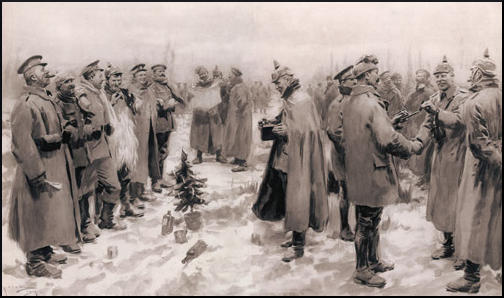
21st October, 2021: Second Lieutenant Dougan Chater, letter to his mother (25th December, 1914)
I think I have seen one of the most extraordinary sights today that anyone has ever seen. About 10 o'clock this morning I was peeping over the parapet when I saw a German, waving his arms, and presently two of them got out of their trenches and some came towards ours. We were just going to fire on them when we saw they had no rifles so one of our men went out to meet them and in about two minutes the ground between the two lines of trenches was swarming with men and officers of both sides, shaking hands and wishing each other a happy Christmas.
Question: Sir John French, the Commander of the British Expeditionary Force, reported that when he heard about the Christmas truce, "I issued immediate orders to prevent any recurrence of such conduct, and called the local commanders to strict account, which resulted in a great deal of trouble." Why did he do this?
For other questions on this subject see: Football on the Western Front (Answer Commentary)
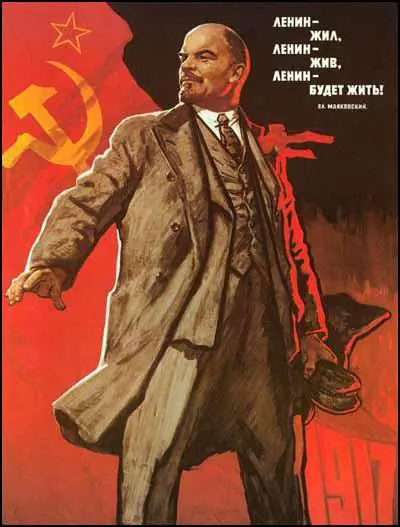
20th October, 2021: Pavel Malyantovich, a Menshevik and the Minister of Justice in the Provisional Government. He was arrested by Vladimir Antonov-Ovseenko and the Red Guards on 25th October, 1917. He later wrote about the incident in his book, In the Winter Palace (1918)
There was a noise behind the door and it burst open like a splinter of wood thrown out by a wave, a little man flew into the room, pushed in by the onrushing crowd which poured in after him, like water, at once spilled into every corner and filled the room.
"Where are the members of the Provisional Government?"
"The Provisional Government is here," said Kornovalov, remaining seated.
"What do you want?"
"I inform you, all of you, members of the Provisional Government, that you are under arrest. I am Antonov-Ovseenko, chairman of the Military Revolutionary Committee."
"Run them through, the sons of bitches! Why waste time with them? They've drunk enough of our blood!" yelled a short sailor, stamping the floor with his rifle."
There were sympathetic replies: "What the devil, comrades! Stick them all on bayonets, make short work of them!"
Antonov-Ovseenko raised his head and shouted sharply: "Comrades, keep calm!" All members of the Provisional Government are arrested. They will be imprisoned in the Fortress of St. Peter and St. Paul. I'll permit no violence. Conduct yourself calmly. Maintain order! Power is now in your hands. You must maintain order!"
Question: What is meant by the statement: "They've drunk enough of our blood"? Explain the chairman of the Military Revolutionary Committee's response to this statement.
For other questions on this subject see: The Bolshevik Revolution (Answer Commentary)
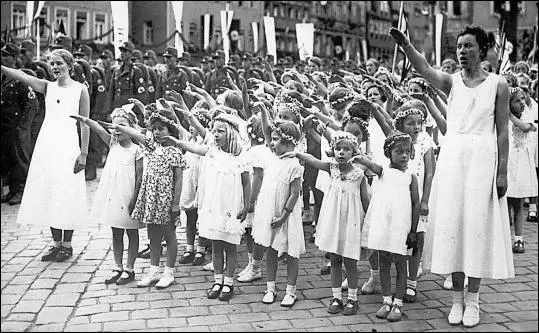
salute and singing the Horst-Wessel, the unofficial anthem of the Nazi Party.
19th October, 2021: Adolf Hitler, speech to the NSDAP Women's Organization (8th September, 1934)
The slogan "emancipation of women" was invented by Jewish intellectuals. If the man's world is said to be the State, his struggle, his readiness to devote his powers to the service of the community, then it may perhaps be said that the woman's in a smaller world. For her world is her husband, her family, her children, and her home. But what would become of the greater world if there were no one to tend and care for the smaller one? The great world cannot survive if the smaller world is not stable. We do not consider it correct for the women to interfere in the world of the man. We consider it natural if these two worlds remain distinct.
Question: Before the Nazi Party took power in 1933, 10% of the Reichstag were women. Afterwards, there were no women represented in the German parliament. Explain Hitler's views on women and politics.
For other questions on this subject see: Women in Nazi Germany (Answer Commentary)
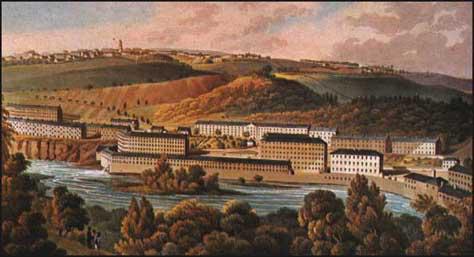
18th October, 2021: On the 26th April, 1816, Robert Owen appeared before a House of Commons Committee.
Question: At what age to take children into your mills?
Robert Owen: At ten and upwards.
Question: Why do you not employ children at an earlier age?
Robert Owen: Because I consider it to be injurious to the children, and not beneficial to the proprietors.
Question: What reasons have you to suppose it is injurious to the children to be employed at an earlier age?
Robert Owen: Seventeen years ago, a number of individuals, with myself, purchased the New Lanark establishment from Mr. Dale. I found that there were 500 children, who had been taken from poor-houses, chiefly in Edinburgh, and those children were generally from the age of five and six, to seven to eight. The hours at that time were thirteen. Although these children were well fed their limbs were very generally deformed, their growth was stunted, and although one of the best schoolmasters was engaged to instruct these children regularly every night, in general they made very slow progress, even in learning the common alphabet. I came to the conclusion that the children were injured by being taken into the mills at this early age, and employed for so many hours; therefore, as soon as I had it in my power, I adopted regulations to put an end to a system which appeared to me to be so injurious.
Question: Do you give instruction to any part of your population?
Robert Owen: Yes. To the children from three years old upwards, and to every other part of the population that choose to receive it.
Question: If you do not employ children under ten, what would you do with them?
Robert Owen: Instruct them, and give them exercise.
Question: Would not there be a danger of their acquiring, by that time, vicious habits, for want of regular occupation.
Robert Owen: My own experiences leads me to say, that I found quite the reverse, that their habits have been good in proportion to the extent of their instruction.
Question: Some textile mills employed children as young as five years old. Why did Robert Owen only employ children from the age of ten?
For other questions on this subject see: Robert Owen and New Lanark (Answer Commentary)
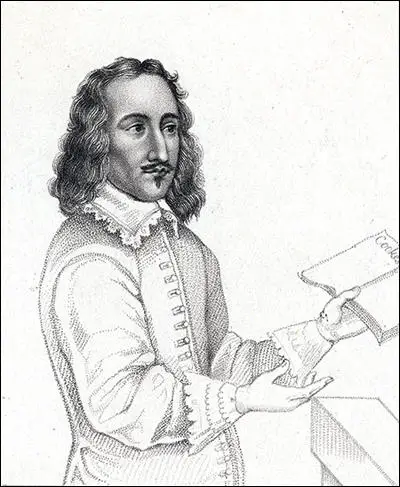
15th October, 2021: Elizabeth Lilburne, A Petition of Women (5th May, 1649)
That since we are assured of our creation in the image of God, and of an interest in Christ equal unto men, as also of a proportional share in the freedoms of this commonwealth, we cannot but wonder and grieve that we should appear so despicable in your eyes as to be thought unworthy to petition or represent our grievances to this honourable House....
Would you have us keep at home in our houses, when men of such faithfulness and integrity as the four prisoners (John Lilburne, Richard Overton, William Walwyn, John Wildman) our friends in the Tower, are fetched out of their beds and forced from their houses by soldiers, to the affrighting and undoing of themselves, their wives, children, and families? Are not our husbands, our selves, our daughters and families, by the same rule as liable to the like unjust cruelties as they?
Nay, shall such valiant, religious men as Mr. Robert Lockyer be liable to court martial, and to be judged by his adversaries, and most inhumanly shot to death? Shall the blood of war be shed in time of peace? Doth not the word of God expressly condemn it? And are we Christians, and shall we sit still and keep at home, while such men as have borne continual testimony against the injustice of all times and unrighteousness of men, be picked out and be delivered up to the slaughter? And yet must we show no sense of their sufferings, no tenderness of affection, no bowels of compassion, nor bear any testimony against so abominable cruelty and injustice?
Question: Why is this document important in understanding the history of the campaign for women's suffrage?
For other questions on this subject see: John Lilburne and the Levellers (Answer Commentary)
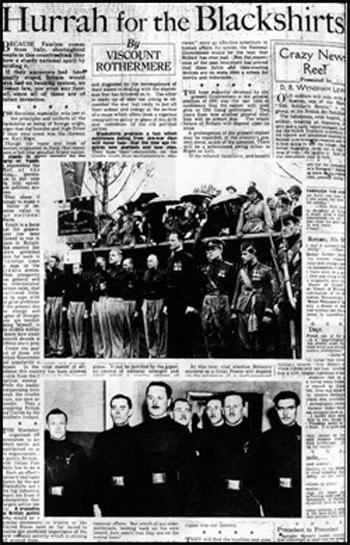
14th October, 2021: Lord Rothermere, The Daily Mail (22nd January, 1934)
Timid alarmists all this week have been whimpering that the rapid growth in numbers of the British Blackshirts is preparing the way for a system of rulership by means of steel whips and concentration camps. Very few of these panic-mongers have any personal knowledge of the countries that are already under Blackshirt government. The notion that a permanent reign of terror exists there has been evolved entirely from their own morbid imaginations, fed by sensational propaganda from opponents of the party now in power. As a purely British organization, the Blackshirts will respect those principles of tolerance which are traditional in British politics. They have no prejudice either of class or race. Their recruits are drawn from all social grades and every political party. Young men may join the British Union of Fascists by writing to the Headquarters, King's Road, Chelsea, London, S.W."
Question: In July 1934 The Daily Mail stop supporting Oswald Mosley and the National Union of Fascists but continued to give support to Adolf Hitler in Nazi Germany. Can you explain why Lord Rothermere took this decision.
For other questions on this subject see: Lord Rothermere, Daily Mail and Adolf Hitler (Answer Commentary)
13th October, 2021: Thomas Hawksley, interviewed by a Parliamentary Committee (15th February, 1844)
Q: What has been the effect produced on their habits by the introduction of water into the houses of the labouring classes?
A: At Nottingham the increase of personal cleanliness was at first very marked indeed; it was obvious in the streets. The medical men reported that the increase of cleanliness was very great in the houses, and that there was less disease.
Q: When, on the return home of the labourers' family, old or young, tired perhaps with the day's labour, the water has to be fetched from a distance out of doors in cold or in wet, in frost or in snow, is it not well known to those acquainted with the labourers' habit that the use of clean water, and the advantages of washing and cleanliness, will be foregone to avoid the annoyance of having to fetch the water?
A: Yes, that is a general and notorious fact. When the distance to be traversed is comparatively trifling, it still operates against the free use of water.
Q: Before the water was laid on in the houses of Nottingham, were the labouring classes accustomed to purchase water?
A: Before the supply was laid on in the houses water was sold chiefly to the labouring-classes by carriers at the rate of one farthing a bucket; and if the water had to be carried any distance up a court a halfpenny a bucket was, in some instances, charged. In general it was sold at about three gallons for a farthing. But the Company now delivers to all the town 76,000 gallons for £1; in other words, carries into every house 79 gallons for a farthing, and delivers water night and day, at every instant of time that it is wanted, at a charge 26 times less than the old delivery by hand.
Question: (a) What is the meaning of the term laissez-faire? (b) Use the information in the interview with Thomas Hawksley to explain why most MPs gradually changed their mind about the doctrine of laissez-faire.
For other questions on this subject see: Public Health Reform in the 19th century (Answer Commentary)
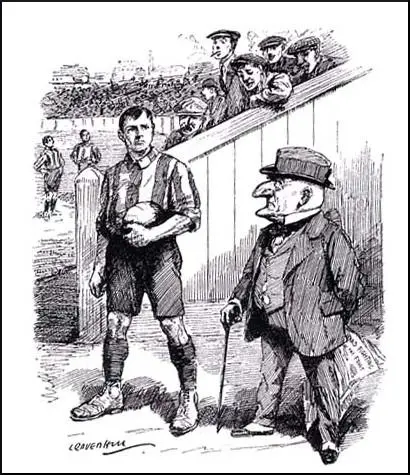
but there's only one field today where you can get honour." (21st October, 1914)
12th October, 2021: A. F. Pollard, letter to The Times (7th November, 1914)
Football is an excellent thing, even in time of war. Armies and navies can only be maintained so long as the community fulfils its function of producing means for their support; and healthy recreation is essential for efficient production. A man may be doing his duty in other fields than the front. But there is no excuse in diverting from the front thousands of athletes in order to feast the eyes of crowds of inactive spectators, who are either unfit to fight or else unfit to be fought for ... Every club who employs a professional player is bribing a needed recruit to refrain from enlistment, and every spectator who pays his gate money is contributing so much towards a German victory.
Question: Why did A. F. Pollard believe that professional football should be brought to an end in 1914?
For other questions on this subject see: Football and the First World War (Answer Commentary)
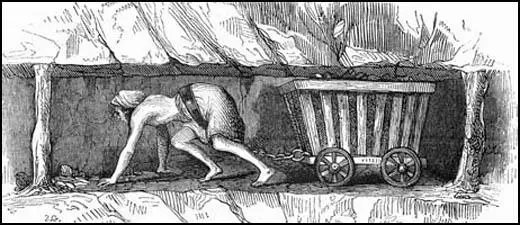
11th October, 2021: The testimony of Betty Harris, aged 37, that appeared in The Physical and Moral Condition of the Children and Young Persons employed in Mines and Manufactures (1843)
I was married at 23 and went into a colliery when I was married. I used to weave when about 12 years old, and can neither read nor write. I work to Andrew Knowles, of Little Bolton, and make sometimes about 7s. a week, sometimes not so much. I am a drawer, and work from six o'clock in the morning to six at night. stop about an hour at noon to eat my dinner: I have bread and butter for dinner; I get no drink. I have two children, but they are too young to work. I worked at drawing when I was in the family way. I know a woman who has gone home and washed herself, taken to her bed, been delivered of a child, and gone to work again under a week. I have a belt round my waist, and a chain passing between my legs, and I go on my hands and feet. The road is very steep, and we have to hold the rope; and, where there is no rope, by anything we can catch hold of. There are six women and about six boys and girls in the pit I work in; it is very hard work for a woman. The pit is very wet where I work, and the water comes over the clog-tops always, and I have seen it up to my thighs: it rains in at the roof terribly; my clothes were wet through almost all day long. I never was ill in my life but when I was lying-in. My cousin looks after the children in the day-time, I am very tired when I get home at night; I fall asleep sometimes before I get washed. I am not so strong as I was, and cannot stand my work so well as I used to do. I have drawn till I have had the skin off me: the belt and chain is worse when we are in the family way. My feller [husband] has beaten me many a time for not being ready. I were not used to it at first, and he had little patience: I have known many a man beat his drawer. I have known men take liberties with the drawers, and some of the women have bastards. I think it would be better if we were paid once a week instead of once a month, for then I would buy victuals with ready money. It is bad to live on 7s., and rent 1s. 6d.
I have been hurt once: I got on a waggon of coals in the pit to get out of the way of the next waggon, and the waggon I was on went off before I could get off, and crushed my bones about the hips between the roof and the coals: I was ill 23 weeks. Mr. Fitzgerald and Mr. Fletcher will not have Mr. women in the pits. I have heard of knocks or joults: I had my arm broken by a waggon; I had gotten all out of the road by my arm. and it broke my arm.
The women are frequently wicked, and swear dreadfully at the bottom of the pit at each other, about their turn to hook-on. They are like to stand up for themselves; keeping one from hooking-on is like taking the meat out of one's mouth. There are some women that go to church regularly, and some that does not. Women with a family can seldom go to church. Some have a mother to look after. Collier's houses are generally ill off for furniture. I have a table and a bed, and I have a tin kettle to boil potatoes in. I wear a pair of trousers and a jacket, and am very hot when working, but cold when standing still. They beat the children badly; if they are very little they get beat. There is a great deal on managing a house; some can manage better than others; those that can write and have been properly taught can manage best. My husband can read and write.
Question: Explain the problems for married women who worked underground in the collieries.
For other questions on this subject see: Women in the Coalmines (Answer Commentary)
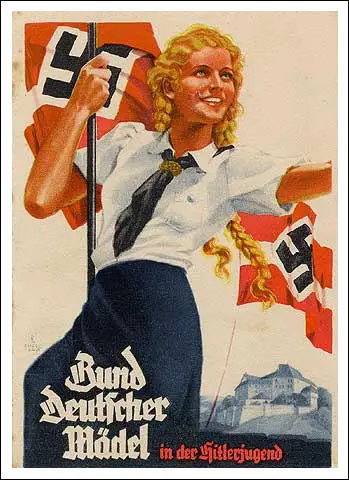
8th October, 2021: Marianne Gärtner, The Naked Years: Growing up in Nazi Germany (1987)
One day, fittingly enough on Hitler's birthday, my age group was called up and I took the oath: "I promise always to do my duty in the Hitler Youth, in love and loyalty to the Führer." Service in the Hitler Youth, we were told, was an honourable service to the German people. I was, however, not thinking of the Führer, nor of serving the German people, when I raised my right hand, but of the attractive prospect of participating in games, sports, hiking, singing, camping and other exciting activities away from school and the home. A uniform, a badge, an oath, a salute. There seemed to be nothing to it. Not really. Thus, unquestioningly, and as smoothly as one day slips into another, I acquired membership, and forthwith attended meetings, joined ball games and competitions, and took part in weekend hikes; and I thought that whether we were sitting in a circle around a camp fire or just rambling through the countryside and singing old German folk songs...
There were now lectures on national socialism, stories about modern heroes and about Hitler, the political fighter, while extracts from Mein Kampf were used to expound the new racial doctrines. And there was nothing equivocal about the mother-role the Führer expected German women to play....
A special period dealt with the role the Jews had played in the German economy, and the threat they represented to the master race. To back up the lecture, a film was shown which portrayed the archetypal Jew as a suave, potbellied and shifty-eyed city type posing beside gargantuan moneybags. Alternatively, he was depicted as a long-bearded, sunken eyed scarecrow of a man who inspired fear and revulsion. The soundtrack spat the film-makers' contempt into the classroom: The Jews are eyesores on the German landscape, boils on the back of the German people, a subhuman species comparable only to rats! A voice seething with chilling hatred: They must be eradicated!"
At one meeting, while addressing us on the desirability of large, healthy families, the team leader raised her voice: "There is no greater honour for a German woman than to bear children for the Führer and for the Fatherland! The Führer has ruled that no family will be complete without at least four children, and that every year, on his mother's birthday, all mothers with more than four children will be awarded the Mutterkreuz. (Decoration similar in design to the Iron Cross (came in bronze, silver or gold, depending on number of children).
Make-up and smoking emerged as cardinal sins. "A German woman does not use make-up! Only Negroes and savages paint themselves! A German woman does not smoke! She has a duty to her people to keep fit and healthy! Any questions?"
"Why isn't the Führer married and a father himself?" The question was out before I had time to check myself. It was an innocent question, devoid of any pert insinuation that the Führer ought to practise what he preached. Silence filled the whitewashed room, but the team leader offered neither answer nor reproved the question. She strafed me with a murderous look, then called for attention.
"Now, I want you all to learn the Horst Wessel Lied by next Wednesday. All three verses. And don't forget the rally on Saturday! Make sure your blouses are clean, your shoes polished, your cheeks rosy and your voices bright! Hell Hitler! Dismissed!"
Question: Marianne Gärtner, published her autobiography, The Naked Years: Growing up in Nazi Germany (1987), nearly 50 years after she was a member of the Bund Deutscher Mädel (German League of Girls). Does this pose problems for a historian who wants to use this information to understand what it was like to be a member of Nazi youth organization?
For other questions on this subject see: German League of Girls (Answer Commentary)

7th October, 2021: Archibald Prentice, Historical Sketches and Personal Recollections of Manchester (1851)
On 27th April a riotous assembly took place at Middleton. The weaving factory of Mr. Burton and Sons had been previously threatened in consequence of their mode of weaving being done by the operation of steam. The factory was protected by soldiers, so strongly as to be impregnable to their assault; they then flew to the house of Mr. Emanuel Burton, where they wreaked their vengeance by setting it on fire. On Friday, the 24th April, a large body of weavers and mechanics began to assemble about midday, with the avowed intention of destroying the power-looms, together with the whole of the premises, at Westhoughton. The military rode at full speed to Westhoughton; and on their arrival were surprised to find that the premises were entirely destroyed, while not an individual could be seen to whom attached any suspicion of having acted a part in this truly dreadful outrage.
In 1785, Edmund Cartwright, the younger brother of Major John Cartwright, invented a weaving machine which could be operated by horses or a waterwheel. Cartwright began using power looms in a mill that he part-owned in Manchester. An unskilled boy could weave three and a half pieces of material on a power loom in the time a skilled weaver using traditional methods, wove only one.
In the early months of 1811 the first threatening letters from General Ned Ludd and the Army of Redressers, were sent to employers in Nottingham. Workers, upset by wage reductions and the use of unapprenticed workmen, began to break into factories at night to destroy the new machines that the employers were using. In a three-week period over two hundred stocking frames were destroyed. In March, 1811, several attacks were taking place every night and the Nottingham authorities had to enroll four hundred special constables to protect the factories. To help catch the culprits, the Prince Regent offered £50 to anyone "giving information on any person or persons wickedly breaking the frames". These men became known as Luddites.
Question: Why were the men in Middleton so upset with the owners of the weaving factory of Burton and Sons?
For other questions on this subject see: The Luddites: 1775-1825 (Answer Commentary)
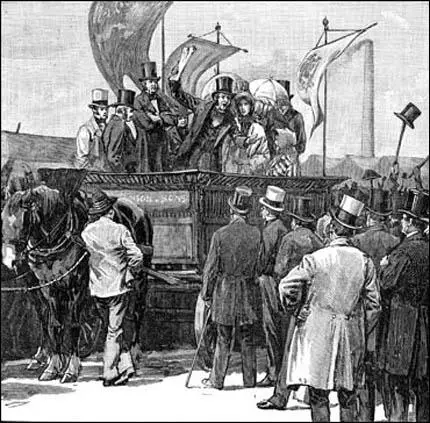
6th October, 2021: R. J. Richardson, The Rights of Women (1840)
If a woman is qualified to be a queen over a great nation, armed with power of nullifying the powers of Parliament. If it is to be admissible that the queen, a woman, by the constitution of the country can command, can rule over a nation, then I say, women in every instance ought not to be excluded from her share in the executive and legislative power of the country.
If women be subject to pains and penalties, on account of that infringement of any laws or laws - even unto death - in the name of common justice, she ought to have a voice in making the laws she is bound to obey.
It is a most introvertive fact, that women contribute to the wealth and resources of the kingdom. Debased is the man who would say women have no right to interfere in politics, when it is evident, that they have as much right as a man.
Question: When the People's Charter was first drafted by the leaders of the London Working Men's Association in 1838, a clause was included that advocated the extension of the franchise to women. This was eventually removed because some members believed that such a radical proposal "might retard the suffrage of men". As one author pointed out, "what the LWMA feared was the widespread prejudice against women entering what was seen as a man's world". Use the information in this source to explain why some people believed that women should have the vote.
For other questions on this subject see: Women and the Chartist Movement (Answer Commentary)
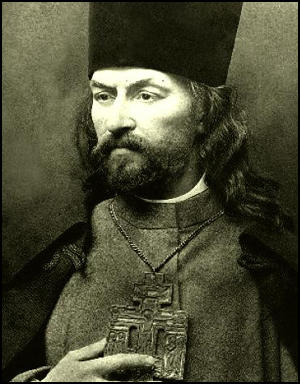
5th October, 2021: Father George Gapon, The Story of My Life (1905)
The procession moved in a compact mass. In front of me were my two bodyguards and a yellow fellow with dark eyes from whose face his hard labouring life had not wiped away the light of youthful gaiety. On the flanks of the crowd ran the children. Some of the women insisted on walking in the first rows, in order, as they said, to protect me with their bodies, and force had to be used to remove them.
Suddenly the company of Cossacks galloped rapidly towards us with drawn swords. So, then, it was to be a massacre after all! There was no time for consideration, for making plans, or giving orders. A cry of alarm arose as the Cossacks came down upon us. Our front ranks broke before them, opening to right and left, and down the lane the soldiers drove their horses, striking on both sides. I saw the swords lifted and falling, the men, women and children dropping to the earth like logs of wood, while moans, curses and shouts filled the air.
Again we started forward, with solemn resolution and rising rage in our hearts. The Cossacks turned their horses and began to cut their way through the crowd from the rear. They passed through the whole column and galloped back towards the Narva Gate, where - the infantry having opened their ranks and let them through - they again formed lines.
We were not more than thirty yards from the soldiers, being separated from them only by the bridge over the Tarakanovskii Canal, which here masks the border of the city, when suddenly, without any warning and without a moment's delay, was heard the dry crack of many rifle-shots. Vasiliev, with whom I was walking hand in hand, suddenly left hold of my arm and sank upon the snow. One of the workmen who carried the banners fell also. Immediately one of the two police officers shouted out "What are you doing? How dare you fire upon the portrait of the Tsar?"
An old man named Lavrentiev, who was carrying the Tsar's portrait, had been one of the first victims. Another old man caught the portrait as it fell from his hands and carried it till he too was killed by the next volley. With his last gasp the old man said "I may die, but I will see the Tsar".
Both the blacksmiths who had guarded me were killed, as well as all these who were carrying the ikons and banners; and all these emblems now lay scattered on the snow. The soldiers were actually shooting into the courtyards at the adjoining houses, where the crowd tried to find refuge and, as I learned afterwards, bullets even struck persons inside, through the windows.
At last the firing ceased. I stood up with a few others who remained uninjured and looked down at the bodies that lay prostrate around me. Horror crept into my heart. The thought flashed through my mind, And this is the work of our Little Father, the Tsar". Perhaps the anger saved me, for now I knew in very truth that a new chapter was opened in the book of history of our people.
For other questions on this subject see: Bloody Sunday (Answer Commentary)
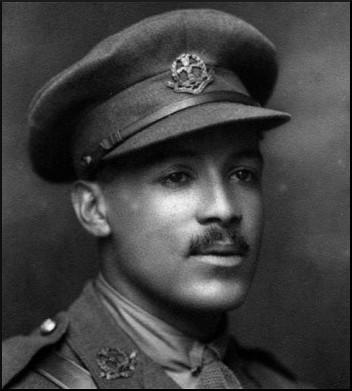
4th October, 2021: Lieutenant Pickard, letter to Edward Tull-Warnock (17th April 1918)
Of course you have already heard of the death of 2nd Lieutenant W. D. Tull on March 25th last.
Being at present in command (the captain was wounded) - allow me to say how popular he was throughout the Battalion. He was brave and conscientious; he had been recommended for the Military Cross, and had certainly earned it, the Commanding Officer had every confidence in him, and he was liked by the men.
Now he has paid the supreme sacrifice; the Battalion and Company have lost a faithful officer; personally I have lost a friend. Can I say more, except that I hope that those who remain may be true and faithful as he.
Question: Walter Tull was hit by machine-gun fire in No Mans Land on 25th March, 1918. Several men attempted to bring him back to British lines. Read about Tull's life and read the source above and explain what this tell us about his relationship with his men?
For other questions on this subject see: Walter Tull: Britain's First Black Officer (Answer Commentary)

